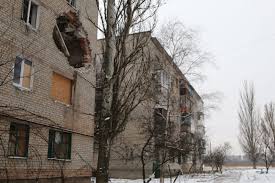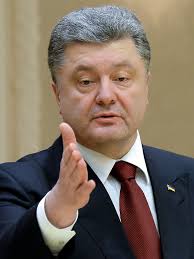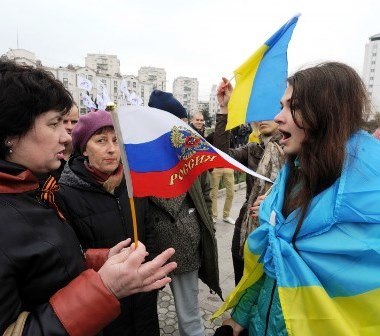Last month a major battle broke out between Russian-backed insurgents and Ukrainian forces in the town of Avdiivka in Ukraine. Alongside the return of such violence in the Donbas, Ukrainian society has changed greatly since 2014 in ways that impact the chances for conflict resolution. In this two-part commentary series, PONARS Eurasia members argue for the importance of properly understanding regional divergences in identity, public political attitudes and preferences, the sources of the escalation of violence in the Donbas, how the Yanukovych system persists under Poroshenko, and the impact of the Trump administration.
Volodymyr Dubovyk, Mechnikov National University, Odessa
It is difficult to get to the bottom of why that escalation in Avdiivka happened when it did (late January-early February 2017). Some said that the insurgent groups were reacting to the Ukrainian army’s slight advance in the dividing zone.
One important aspect to keep in mind is that the Ukrainian army has retaken some towns and villages that were supposed to be under Ukrainian control anyway according to the Minsk agreements. Therefore, when it comes to violations and incidents, context is always needed. In quite a few of the other towns and villages over which the Ukrainian army re-asserted control, there was not much “newsworthy” fighting because many of those locales were not defended by insurgents.

Some have mentioned that some of the violence in Avdiivka and elsewhere is related to Ukrainian attempts to implement blockades of the self-proclaimed republics in order to jeopardize their standing and curtail smuggling, which is rife along the dividing lines. This could have irritated some insurgent groups and tensions boiled over. However, I do not think this could have resulted in the unusually pronounced escalation we saw in Avdiivka.
What is clear is that escalations like the one in Avdiivka definitely require encouragement and probably direct orders from Moscow. I do not think the leadership in those republics has the independent decision-making capacity to embark on that kind of warfighting.
An interesting question is, was there a connection between the Avdiivka escalation and the emergence of the Trump administration in Washington? Some said that Putin felt emboldened by Trump’s lack of attention and forcefulness, making Putin believe he had carte-blanche to “deal” with Ukraine. Alternatively, some said that Putin expected a hint about the easing or lifting of sanctions, but then became disappointed and decided to escalate the conflict in the Donbas to send a signal to the new team in Washington.
Speaking of signals, the outlook from the new U.S. administration toward the Ukraine conflict has been diverse and confusing. On the one hand, UN Ambassador Nimrata Haley and White House Press Secretary Sean Spicer have insisted that Russia needs to return Crimea to Ukraine. At the same time, Trump himself seems to continually cast Russia and Putin in a positive light. It is quite possible that Trump has a plan to normalize relations with Moscow — perhaps at the expense of Ukraine — but he is certainly realizing that the political and strategic game involving Europe, Ukraine, and Russia is far more complicated than it seems.
Serhiy Kudelia, Baylor University
I think the continuities in the rules of the political game in Ukraine are more striking than the changes that have occurred since the Euromaidan revolution. Just like his predecessor Viktor Yanukovych, President Petro Poroshenko is ruling the country through a close circle of loyalists and business cronies who exercise control over major state assets and divert state funds into private offshore accounts. Moreover, just like in the Yanukovych era, in Ukraine today:

– Formal institutions, like the Cabinet of Ministers, the governing coalition in the parliament and the new Anti-Corruption Bureau, have been sidelined through informal institutional arrangements based on quid-pro-quo deals between members of the president’s clique.
– Law enforcement bodies, especially the Prosecutor General and the Security Service, have become the president’s personal instruments of extortion and harassment used against political opponents or gain lucrative businesses.
– There is no accountability for grand corruption or other crimes committed by the members of the ruling elite.
– The judiciary remains highly politicized and subordinated to the political whims of the president.
– The president and his cronies are pressuring the owners of independent media outlets to sell their assets or censor any reporting critical of the president.
– The president and his “political technologists” have been creating fake opposition parties and buying voters in order to get his loyalists elected into the parliament or local councils.
– The Presidential Administration has been engaged in negative campaigning against the president’s key political rivals in the forthcoming presidential election.
In addition, the killings of prominent Ukrainian journalists that happened under Poroshenko’s watch remain unresolved. The government stonewalled the investigation of alleged human rights by the Security Service and refused to seriously investigate allegations by international organizations regarding the use of banned cluster munitions in the Donbas conflict. Finally, the use of violence to resolve political disputes has been normalized with the inclusion of members of paramilitary battalions into the political process. The increasingly common use of violent tools in political competition has been the most important change in Ukrainian politics since 2014. The best that the new U.S. administration can do in dealing with Poroshenko’s regime is to recognize its multiple and serious democratic deficiencies and exert pressure to address them in an open and principled manner.
Yuriy Matsiyevsky, Ostroh Academy National University
Regional identities are and will continue to be an important factor in Ukrainian internal politics and political debates for years to come. With about 5 million ethnic Russians and 8-9 million Russian speakers living in Ukraine, the issue of language and identity have only sharpened since the war erupted in 2014. There are several questions for which there are no clear answers.
 First, what to do with 4 million people residing in occupied Donbas? The territory might sooner or later be returned to Ukraine, but how to reintegrate a traumatized and mostly disloyal population? Second, though the “Russian spring” project largely failed in Ukraine, it will long remain a Kremlin trump card to play the Russian “ethnic card” on neighboring states. What is Kyiv’s policy to help Russian-speakers be and remain loyal citizens of Ukraine in the years to come? Third, what kind of a nation will Ukraine be after the war? Will it emerge as a civic or ethnic nation?
First, what to do with 4 million people residing in occupied Donbas? The territory might sooner or later be returned to Ukraine, but how to reintegrate a traumatized and mostly disloyal population? Second, though the “Russian spring” project largely failed in Ukraine, it will long remain a Kremlin trump card to play the Russian “ethnic card” on neighboring states. What is Kyiv’s policy to help Russian-speakers be and remain loyal citizens of Ukraine in the years to come? Third, what kind of a nation will Ukraine be after the war? Will it emerge as a civic or ethnic nation?
One visible outcome of Russia’s war in Ukraine is the coalescence of Ukrainian identity in all regions of the state. With the "loss" of some 6 million people, mainly ethnic Russians who stayed in the occupied territories, the share of ethnic Ukrainians grew from 78% to about 85% since the war began. This change makes Ukraine a more ethnically homogeneous state. While some are tempted to see this as a chance to build an ethnic nation, others, like the Crimean Tatars, are worried about being marginalized again.
These and many related questions have no easy answers because the Ukrainian political elite has never agreed on a single nation-building policy to pursue. Actually, the prime cause in Ukraine’s difficult policy planning lies deeper than it seems. Developing and enacting any long-term policy — be it defense, health care, social security, or nation-building — requires effective leadership and viable state institutions. As long as statecraft continues to be a source of rents for the kleptocratic elite, nation-building, like many other initiatives, will depend on the will of society and not state structures. I think this process may drag on for years, and battles over “memories” and “identities” will long remain a salient issue in Ukraine.
See Part 1 with commentary by Samuel Charap, Elise Giuliano, and Mikhail Alexseev.











